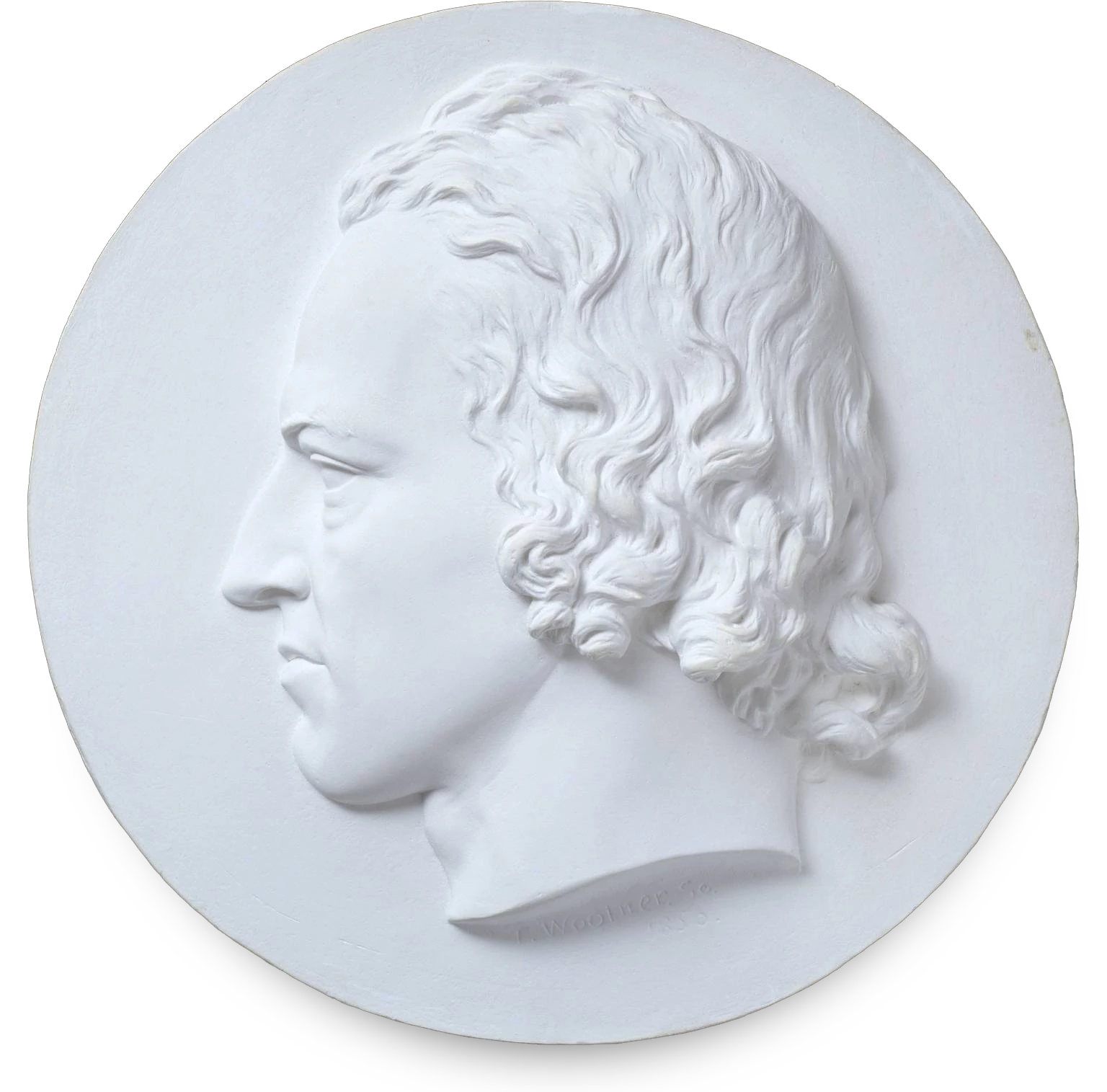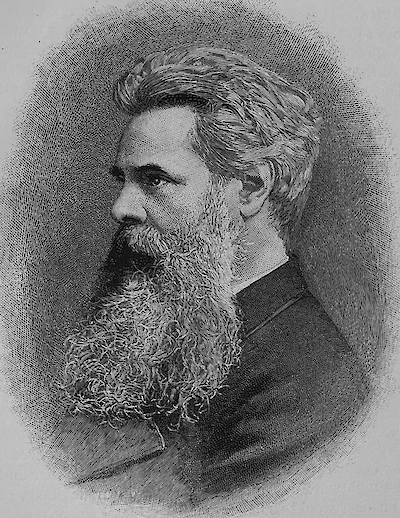

Thomas Woolner
Sculptor turned poet, Pre-Raphaelite turned Neoclassicist
1825 – 1892[Editor’s note: The following poem was written by sculptor and poet Thomas Woolner for the first volume of the Pre-Raphaelite Brotherhood magazine titled “The Germ.” Woolner was 25 years old when the poem was published, so we must grant him some measure of forgiveness for the syrupy nature of his verse.]
I love my lady; she is very fair;
Her brow is white, and bound by simple hair;
Her spirit sits aloof, and high,
Altho’ it looks thro’ her soft eye
Sweetly and tenderly.
As a young forest, when the wind drives thro',
My life is stirred when she breaks on my view.
Altho’ her beauty has such power,
Her soul is like the simple flower
Trembling beneath a shower.
As bliss of saints, when dreaming of large wings,
The bloom around her fancied presence flings,
I feast and wile her absence, by
Pressing her choice hand passionately—
Imagining her sigh.
My lady’s voice, altho’ so very mild,
Maketh me feel as strong wine would a child;
My lady’s touch, however slight,
Moves all my senses with its might,
Like to a sudden fright.
A hawk poised high in air, whose nerved wing-tips
Tremble with might suppressed, before he dips,—
In vigilance, not more intense
Than I; when her word’s gentle sense
Makes full-eyed my suspense.
Her mention of a thing—august or poor,
Makes it seem nobler than it was before:
As where the sun strikes, life will gush,
And what is pale receive a flush,
Rich hues—a richer blush.
My lady’s name, if I hear strangers use,—
Not meaning her—seems like a lax misuse.
I love none by my lady’s name;
Rose, Maud, or Grace, are all the same,
So blank, so very tame.
My lady walks as I have seen a swan
Swim thro’ the water just where the sun shone.
There ends of willow branches ride,
Quivering with the current’s glide,
By the deep river-side.
Whene'er she moves there are fresh beauties stirred;
As the sunned bosom of a humming-bird
At each pant shows some fiery hue,
Burns gold, intensest green or blue:
The same, yet ever new.
What time she walketh under flowering May,
I am quite sure the scented blossoms say,
“O lady with the sunlit hair!
“Stay, and drink our odorous air—
“The incense that we bear:
“Your beauty, lady, we would ever shade;
“Being near you, our sweetness might not fade.”
If trees could be broken-hearted,
I am sure that the green sap smarted,
When my lady parted.
This is why I thought weeds were beautiful;—
Because one day I saw my lady pull
Some weeds up near a little brook,
Which home most carefully she took,
Then shut them in a book.
A deer when startled by the stealthy ounce,—
A bird escaping from the falcon’s trounce,
Feels his heart swell as mine, when she
Stands statelier, expecting me,
Than tall white lilies be.
The first white flutter of her robe to trace,
Where binds and perfumed jasmine interlace,
Expands my gaze triumphantly:
Even such his gaze, who sees on high
His flag, for victory.
We wander forth unconsciously, because
The azure beauty of the evening draws:
When sober hues pervade the ground,
And life in one vast hush seems drowned,
Air stirs so little sound.
We thread a copse where frequent bramble spray
With loose obtrusion from the side roots stray,
(Forcing sweet pauses on our walk):
I’ll lift one with my foot, and talk
About its leaves and stalk.
Or may be that the prickles of some stem
Will hold a prisoner her long garment’s hem;
To disentangle it I kneel,
Oft wounding more than I can heal;
It makes her laugh, my zeal.
Then on before a thin-legged robin hops,
Or leaping on a twig, he pertly stops,
Speaking a few clear notes, till nigh
We draw, when quickly he will fly
Into a bush close by.
A flock of goldfinches may stop their flight,
And wheeling round a birchen tree alight
Deep in its glittering leaves, until
They see us, when their swift rise will
Startle a sudden thrill.
I recollect my lady in a wood,
Keeping her breath and peering—(firm she stood
Her slim shape balanced on tiptoe—)
Into a nest which lay below,
Leaves shadowing her brow.
I recollect my lady asking me,
What that sharp tapping in the wood might be?
I told her blackbirds made it, which,
For slimy morsels they count rich,
Cracked the snail’s curling niche:
She made no answer. When we reached the stone
Where the shell fragments on the grass were strewn,
Close to the margin of a rill;
“The air,” she said, “seems damp and chill,
“We’ll go home if you will.”
“Make not my pathway dull so soon,” I cried,
“See how those vast cloudpiles in sun-glow dyed,
“Roll out their splendour: while the breeze
“Lifts gold from leaf to leaf, as these
“Ash saplings move at ease.”
Piercing the silence in our ears, a bird
Threw some notes up just then, and quickly stirred
The covert birds that startled, sent
Their music thro’ the air; leaves lent
Their rustling and blent,
Until the whole of the blue warmth was filled
So much with sun and sound, that the air thrilled.
She gleamed, wrapt in the dying day’s
Glory: altho’ she spoke no praise,
I saw much in her gaze.
Then, flushed with resolution, I told all;—
The mighty love I bore her,—how would pall
My very breath of life, if she
For ever breathed not hers with me;—
Could I a cherub be,
How, idly hoping to enrich her grace,
I would snatch jewels from the orbs of space;—
Then back thro’ the vague distance beat,
Glowing with joy her smile to meet,
And heap them round her feet.
Her waist shook to my arm. She bowed her head,
Silent, with hands clasped and arms straightened:
(Just then we both heard a church bell)
O God! It is not right to tell:
But I remember well
Each breast swelled with its pleasure, and her whole
Bosom grew heavy with love; the swift roll
Of new sensations dimmed her eyes,
Half closing them in ecstasies,
Turned full against the skies.
The rest is gone; it seemed a whirling round—
No pressure of my feet upon the ground:
But even when parted from her, bright
Showed all; yea, to my throbbing sight
The dark was starred with light.